immune support
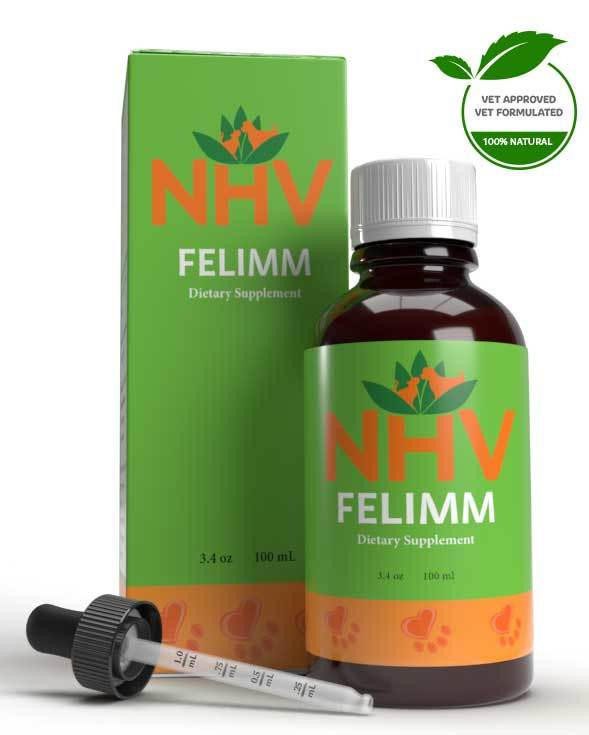
free shipping over $100 (USA & Canada)
1-877-937-4372 the pet expert hotline
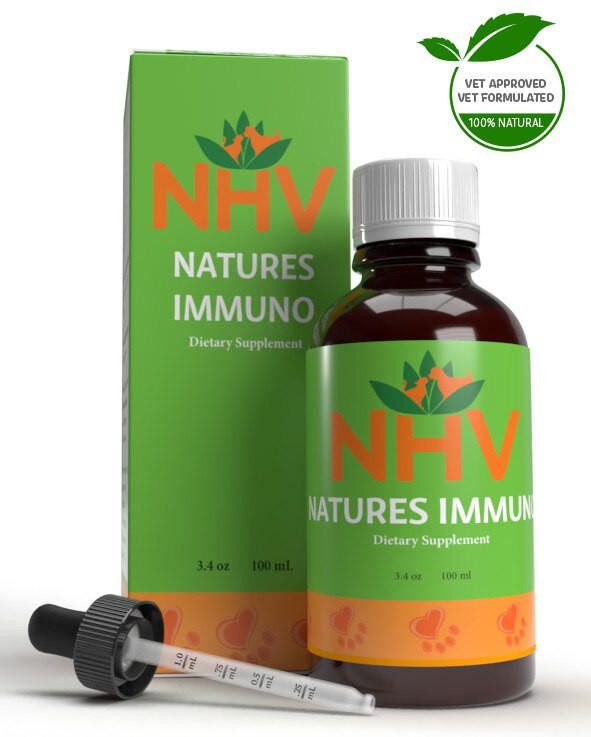
Blend of medicinal mushrooms (turkey tails, cordyceps, reishi, shiitake, agaricus)

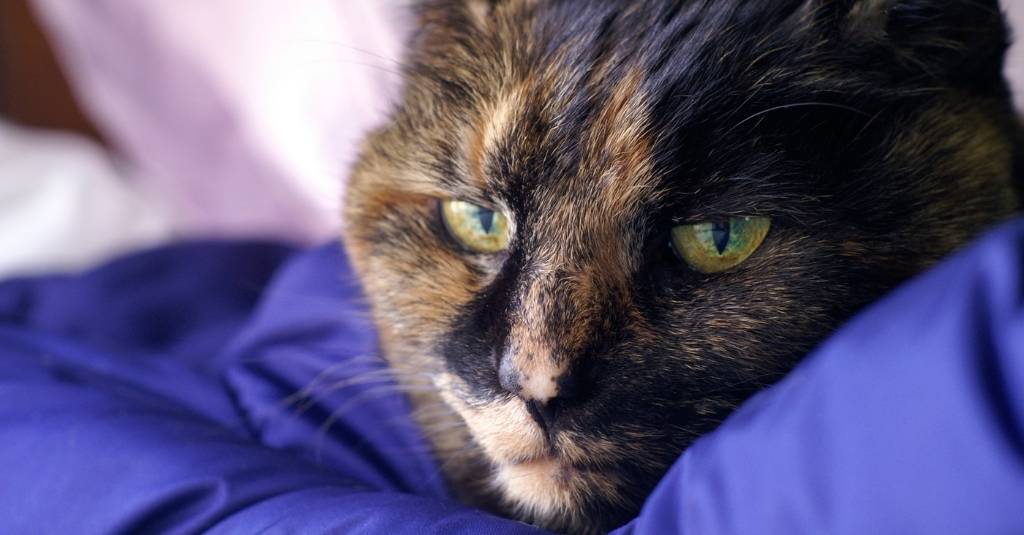
Today we are talking about the most charismatic felines in this world, of course, I am talking about cats. As much as they are independent and appear to be made of iron, kitties can suffer from infectious diseases, especially respiratory ones like Feline Calicivirus.
This disease is highly contagious among cats and can bring a lot of suffering for you and your furry friend. When the necessary care is not taken, it can lead to death.
Calicivirus is an infectious disease that directly affects the respiratory system and is one of the most common and serious diseases in cats. This disease is highly contagious among cats and can bring a lot of suffering for you and your furry friend. When the necessary care is not taken, it can lead to death.
This virus can be very resistant, and many cats get infected with calicivirus when they meet an infected cat. A simple inhalation or contact with saliva is enough for calicivirus to settle in your furry friend’s body. Cats with controlled calicivirus also transmit the disease. Therefore, it is necessary to be incredibly careful! For instance, toys used for kitties that carry the virus can be a way to transmit the disease. Therefore, toys used for infected cats must be discarded or washed, and disinfected with alcohol, to ensure the removal of the Calicivirus.
Although it may seem difficult to protect them against this disease, it is not a catastrophe and I have paw-some news! There is a vaccine that protects kitties against feline calicivirus, and this vaccine is included in most vaccination protocols for kitties. If you are in doubt, you can talk to your veterinarian about this.
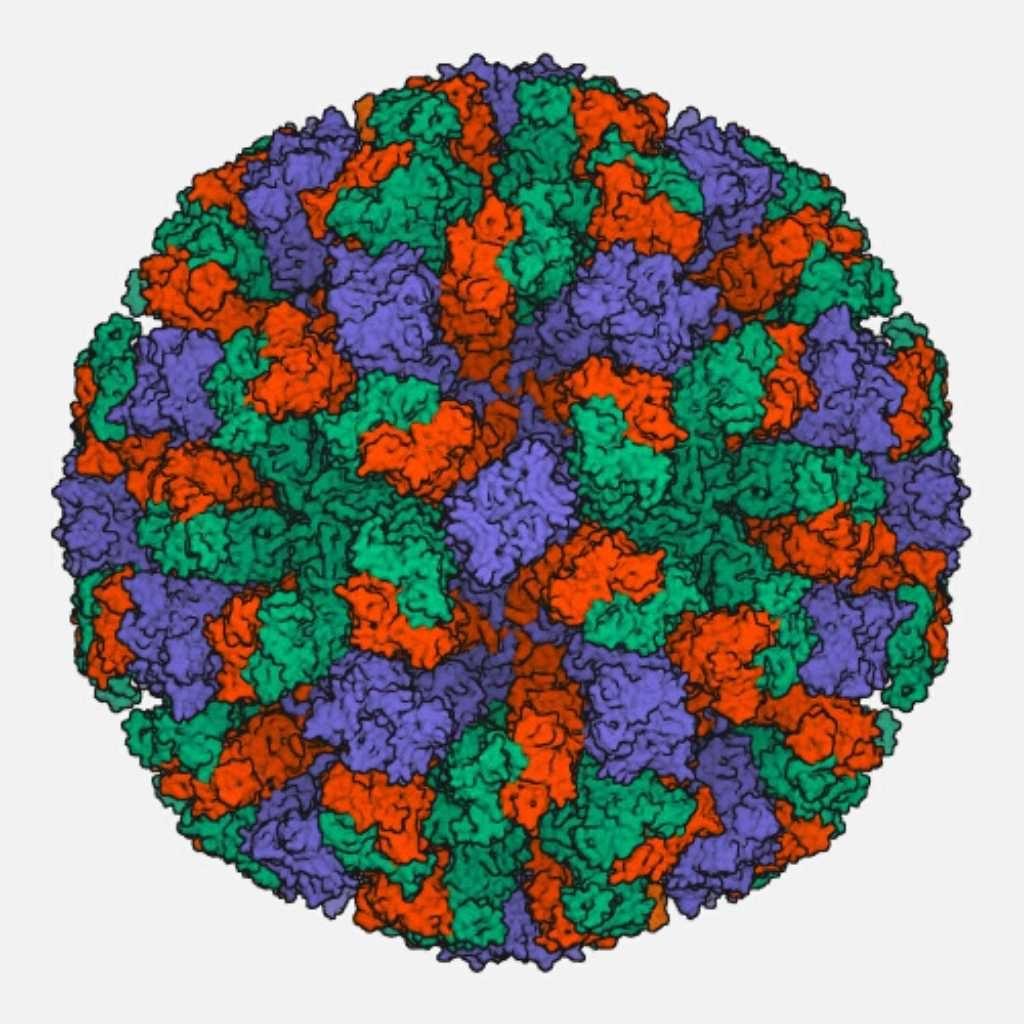
Sometimes it is not possible to vaccinate our cats when they are a kitten. For example, when I adopted my cats, Coconut Sylvester and Ozzy Melinda, they were more than 1-year-old. So, it was too late to protect them when they were kitties. Unfortunately, they already had Feline Herpesvirus, which is another disease that has similar symptoms to Calicivirus.
It is tough to tell if a cat has feline calicivirus based on the symptoms as they are similar to many other diseases such as Feline Herpesvirus. It is also important to make it clear that the symptoms appear and worsen according to the evolution of the disease in the feline’s body. Below I have given some examples:
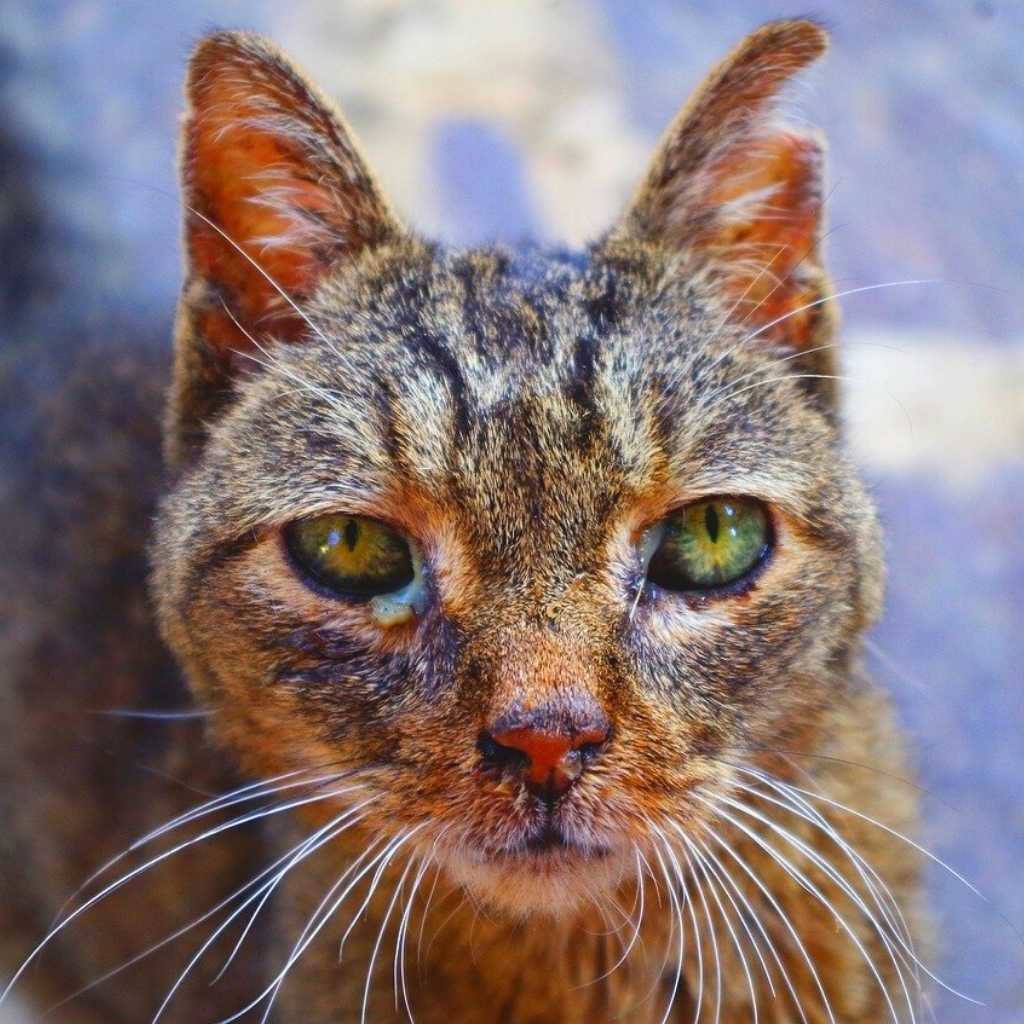
I know, poor babies having all these symptoms! However, laboratory tests can give us the answer to whether or not our kitty has this disease or not. The best is to talk with your vet about that.
The treatment for caliciviruses is based on drugs prescribed by your vet. Unfortunately, there is no specific remedy against Calicivirus. It means that the treatment is supportive, aiming to end all symptoms and the manifestation of the disease.
In addition to the drugs prescribed by your vet, other actions such as a balanced diet and adding NHV supplements are designed to help promote a healthy immune system in your feline friend and work alongside conventional treatment.
Natures Immuno: One of my favorite supplements for pets with viruses. This blend of mushrooms is in a clinical trial at the University of Saskatchewan in Canada and so far, the results are amazing. The mushrooms present in Natures Immuno are known for their extensive health benefits, including their extraordinarily strong properties against viruses. It supports the immune system and helps fight against viral infections. It is also useful for cardiovascular, liver, kidney, diabetic, and endocrine health as well as increasing energy and promoting general well-being.
As it affects the respiratory system Resp-Aid along with Natures Immuno and is an amazing option as well. We just finished a clinical trial with Resp-Aid and it has shown to help reduce the inflammation in the lungs and help improve the symptoms related to infections in the respiratory system. The partial results of this study were published in one of the most prestigious scientific journals in the world, The Immunology Journal, and this year the full results of this research will be published. We will have news for you soon!
Another herbal supplement from NHV that is helpful is Felimm. This formula helps to balance the immune system and helps fight secondary infections that can be related to Feline Calicivirus. In addition, it encourages detoxication of the lymphatic system, stimulates the appetite, improves energy levels, and helps combat upper respiratory tract infections.
Calicivirus also can cause gingivitis and diarrhea. In addition to the previous supplements suggested, Mouth Drops and Plantaeris can be helpful. Mouth Drops is like a natural, herbal mouthwash for pets, and Plantaeris is formulated to naturally help relieve diarrhea.
To finish my recommendations, I would not forget Milk Thistle. As your kitty may be receiving many drugs prescribed by your vet, it is important to protect their kidneys and liver. Therefore, Milk Thistle can be immensely helpful.
I hope you enjoyed this article. If you have any questions about the best regimen for your kitty, just reach out in our comments, on our chat, or on any of our social channels.
immune support

Helps your pet fight Feline Leukemia, FIV virus,other viral infections, and lymphoma
buy 2 and save $3
3 month supply for a small to medium size pet.

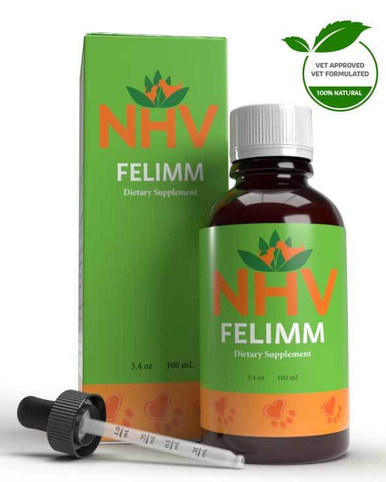

FeLV and FIV have a strong negative impact on your cat’s immune system and general wellbeing. Left untreated, FeLV can cause serious health issues and other cancers, including lymphoma. Add this natural support to the symptomatic treatment for feline leukemia and FIV that your vet recommends along with diet and nutrition to give them the best fighting chance.
It’s important to help balance your cat’s immune system to help them defend against daily contact with environmental bacteria, fungi, viruses, and protozoa.
NHV’s all-natural supplements for feline leukemia and FIV are formulated by a master herbalist, and a holistic veterinarian with over 20 years of experience.
Felimm for cats contains powerful herbal ingredients that help in fighting viruses and balancing your kitty’s natural immune system.
Add this natural support to the treatment for feline leukemia recommended by your veterinarian. Read more about leukemia and FIV on the holistic veterinarian, Dr. Hillary Cook’s blog.
With the right support cats with FeLV and FIV can lead healthy lives.
NHV offers a Feline Leukemia (FeLV) Kit which is available in both a fighter pack and immune and antioxidant support pack. We also provide a Feline Immunodeficiency Virus (FIV) Kit because, at NHV, we believe in giving our pet parents everything they need to care for their kitty naturally.
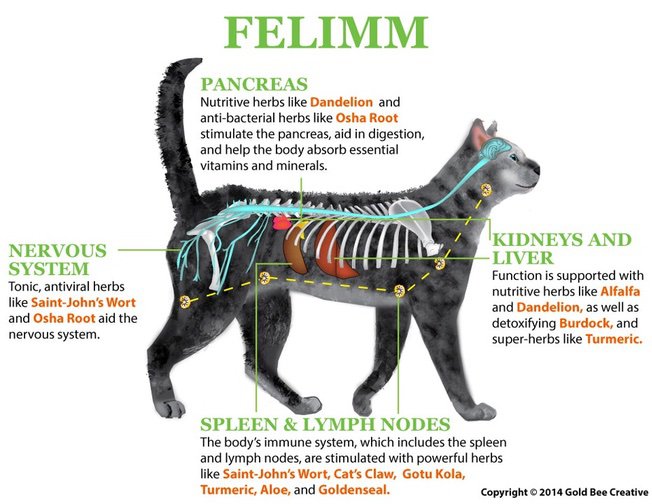
St. John’s Wort – A potent antiviral that helps control viral infections and stimulates your cat’s immune system.
Turmeric – A powerful antioxidant that helps fight the damaging effects of free radicals. It strengthens liver function and contains strong antifungal properties.
Aloe Vera – Contains Acemannan, which has been proposed as an adjunctive therapy for cats with FIV. Aloe also contains high levels of vitamins, minerals, amino acids, and other nutrients important for cats with immune disorders.
Alfalfa – Contains high levels of chlorophyll, which works as an antioxidant in your cat's bloodstream. It also contains nutrients beneficial to cats with immune disorders.
Burdock – Helps cleanse the body of toxins and waste that accumulate during illness. It is also high in calcium, phosphorus, iron, thiamine, and riboflavin.
Cat’s Claw – A powerful anti-inflammatory and antioxidant that supports your cat’s immune system and helps strengthen its defenses against viruses like leukemia.
Osha – A natural immune builder that helps pets fight infections including FeLV and FIV. Also has antibacterial and antiviral properties.
Dandelion – A highly nutritious food that stimulates liver secretion, improves digestion and stimulates appetite. It also protects the kidneys and has anti-inflammatory properties.
Gotu Kola– An antioxidant-rich herb known to strengthen the immune system and protect cells from damage caused by free radicals. Helps calm the nervous system.
Usnea – An immune system stimulant with anti-bacterial and anti-fungal properties that help protect your cat’s weakened immune system from Candida Albicans.
Goldenseal – An immune supporting herb with blood cleansing properties.
Myrrh – Helps control bacterial infections that cats with compromised immune systems are so vulnerable to.
Select your pet's weight to determine the correct dose.
To be taken twice daily. Determine your pet’s weight and then use the easy chart below to determine the correct dose. This is the minimum dosage.
Pet's Weight Dosage
0 - 15 lb = 0.5 ml
16 - 30 lb = 1.0 ml
31 - 45 lb = 1.5 ml
46 - 60 lb = 2.0 ml
61 - 75 lb = 2.5 ml
Over 75 lb = 3.0 ml
How to Administer
Shake well before use. The easiest method is to use the dropper provided and place the drops into your pet’s food or favorite treat. You can also use the dropper and squirt directly into the pet’s mouth. Some pets can be finicky, if this occurs consider hiding the drops in foods most pet’s love such as fish, chicken or yogurt or a favourite treat. If your pet only eats dry food then soak a few kibbles at feeding time.
For Best Results
Herbal dietary supplements are beneficial to the health and well-being of your pet and are safe for long-term use. Every pet responds to natural herbal supplements differently, therefore it is important to be consistent and administer the product daily. Supplements generally take two to four weeks to take effect, however this will vary from one animal to the next.
Product Storage
All NHV Natural Pet Products are pure herbal extracts and contain no artificial additives, preservatives or coloring. Shelf life after opening is 6 months and must be refrigerated after opening.
Cautions and Contraindications
Do not use Felimm in pregnant or nursing animals. Speak to your vet before using our products. A second visit is recommended if your pet’s condition does not improve, or deteriorates after continued use of the supplements.
All information provided by NHV Natural Pet Products is for educational purposes only.
FeLV and FIV have a strong negative impact on your cat’s immune system and general wellbeing. Left untreated, FeLV can cause serious health issues and other cancers, including lymphoma. Add this natural support to the symptomatic treatment for feline leukemia and FIV that your vet recommends along with diet and nutrition to give them the best fighting chance.
It’s important to help balance your cat’s immune system to help them defend against daily contact with environmental bacteria, fungi, viruses, and protozoa.
NHV’s all-natural supplements for feline leukemia and FIV are formulated by a master herbalist, and a holistic veterinarian with over 20 years of experience.
Felimm for cats contains powerful herbal ingredients that help in fighting viruses and balancing your kitty’s natural immune system.
Add this natural support to the treatment for feline leukemia recommended by your veterinarian. Read more about leukemia and FIV on the holistic veterinarian, Dr. Hillary Cook’s blog.
With the right support cats with FeLV and FIV can lead healthy lives.
NHV offers a Feline Leukemia (FeLV) Kit which is available in both a fighter pack and immune and antioxidant support pack. We also provide a Feline Immunodeficiency Virus (FIV) Kit because, at NHV, we believe in giving our pet parents everything they need to care for their kitty naturally.

St. John’s Wort – A potent antiviral that helps control viral infections and stimulates your cat’s immune system.
Turmeric – A powerful antioxidant that helps fight the damaging effects of free radicals. It strengthens liver function and contains strong antifungal properties.
Aloe Vera – Contains Acemannan, which has been proposed as an adjunctive therapy for cats with FIV. Aloe also contains high levels of vitamins, minerals, amino acids, and other nutrients important for cats with immune disorders.
Alfalfa – Contains high levels of chlorophyll, which works as an antioxidant in your cat's bloodstream. It also contains nutrients beneficial to cats with immune disorders.
Burdock – Helps cleanse the body of toxins and waste that accumulate during illness. It is also high in calcium, phosphorus, iron, thiamine, and riboflavin.
Cat’s Claw – A powerful anti-inflammatory and antioxidant that supports your cat’s immune system and helps strengthen its defenses against viruses like leukemia.
Osha – A natural immune builder that helps pets fight infections including FeLV and FIV. Also has antibacterial and antiviral properties.
Dandelion – A highly nutritious food that stimulates liver secretion, improves digestion and stimulates appetite. It also protects the kidneys and has anti-inflammatory properties.
Gotu Kola– An antioxidant-rich herb known to strengthen the immune system and protect cells from damage caused by free radicals. Helps calm the nervous system.
Usnea – An immune system stimulant with anti-bacterial and anti-fungal properties that help protect your cat’s weakened immune system from Candida Albicans.
Goldenseal – An immune supporting herb with blood cleansing properties.
Myrrh – Helps control bacterial infections that cats with compromised immune systems are so vulnerable to.
Select your pet's weight to determine the correct dose.
To be taken twice daily. Determine your pet’s weight and then use the easy chart below to determine the correct dose. This is the minimum dosage.
Pet's Weight Dosage
0 - 15 lb = 0.5 ml
16 - 30 lb = 1.0 ml
31 - 45 lb = 1.5 ml
46 - 60 lb = 2.0 ml
61 - 75 lb = 2.5 ml
Over 75 lb = 3.0 ml
How to Administer
Shake well before use. The easiest method is to use the dropper provided and place the drops into your pet’s food or favorite treat. You can also use the dropper and squirt directly into the pet’s mouth. Some pets can be finicky, if this occurs consider hiding the drops in foods most pet’s love such as fish, chicken or yogurt or a favourite treat. If your pet only eats dry food then soak a few kibbles at feeding time.
For Best Results
Herbal dietary supplements are beneficial to the health and well-being of your pet and are safe for long-term use. Every pet responds to natural herbal supplements differently, therefore it is important to be consistent and administer the product daily. Supplements generally take two to four weeks to take effect, however this will vary from one animal to the next.
Product Storage
All NHV Natural Pet Products are pure herbal extracts and contain no artificial additives, preservatives or coloring. Shelf life after opening is 6 months and must be refrigerated after opening.
Cautions and Contraindications
Do not use Felimm in pregnant or nursing animals. Speak to your vet before using our products. A second visit is recommended if your pet’s condition does not improve, or deteriorates after continued use of the supplements.
All information provided by NHV Natural Pet Products is for educational purposes only.
respiratory support
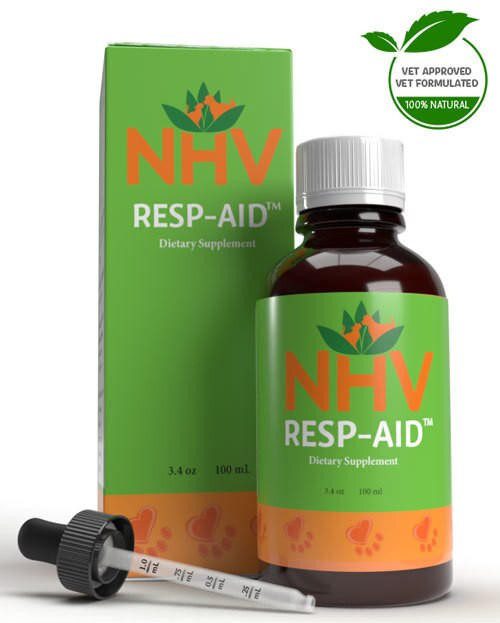
For Coughs, Respiratory Disorders, and Bronchial Infections in Cats
buy 2 and save $3
3 month supply for a small to medium size
Powerful natural support to help your cat breath easy.
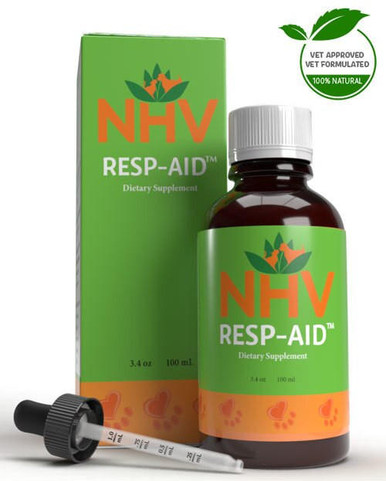
Powerful natural support to help your cat breath easy.
Many cats suffer from breathing difficulties which can lead to respiratory infections. Symptoms of respiratory infections in cats are similar to those in humans such as watery eyes, runny nose, sneezing, coughing, and difficulty breathing. Resp-Aid™ is a holistic all-natural remedy for respiratory infection in cats to help provide them relief.
NHV Resp-Aid is currently under clinical studies conducted jointly with the University of Saskatchewan and the University of Calgary. The study found that the lungs from asthmatic animals treated with Resp-Aid showed considerably less inflammation and histopathology compared with asthmatic animals lungs that did not receive Resp-Aid. You can read the latest on this innovative study here.
Some cat breeds are more susceptible to breathing difficulties such as Siamese. Find out if your cat breed is prone to breathing difficulties at NHV online breeds and conditions. Respiratory infections in cats can be caused by:
Read about a rescue kitty named Hunter and how he found relief with NHV’s remedy for respiratory infection in cats.
If you have questions about natural remedies for respiratory infections in cats or any of our plant-based products you can ask an expert at NHV. Our pet experts can offer guidance and support because NHV wants all pet parents and their fur children to breathe easy naturally.
NHV’s Resp-Aid contains a proprietary blend of nine highly effective herbs that help support healthy breathing making this a formidable remedy for respiratory infections in cats.
Select your pet's weight to determine the correct dose.
To be taken twice daily. Determine your pet’s weight and then use the easy chart below to determine the correct dose. This is the minimum dosage.
Pet's Weight Dosage
0 - 15 lb = 0.5 ml
16 - 30 lb = 1.0 ml
31 - 45 lb = 1.5 ml
46 - 60 lb = 2.0 ml
61 - 75 lb = 2.5 ml
Over 75 lb = 3.0 ml
How to Administer
Shake well before use. The easiest method is to use the dropper provide and places the drops into your pet’s food or favorite treat. You can also use the dropper and squirt directly into the pet’s mouth.
Some pets can be finicky, if this occurs consider hiding the drops in foods most pet’s love such as fish, chicken or yogurt or a favourite treat. If your pet only eats dry food then soak a few kibbles at feeding time.
For Best Results
Herbal dietary supplements are beneficial to the health and wellbeing of your pet and are safe for long-term use. Every pet responds to natural herbal supplements differently, therefore it is important to be consistent and administer the product daily. Supplements generally take two to four weeks to take effect, however this will vary from one animal to the next.
Product Storage
All NHV Natural Pet Products are pure herbal extracts and contain no artificial additives, preservatives or coloring. Shelf life after opening is 6 months and must be refrigerated after opening.
Cautions and Contraindications
Do not use in pregnant or nursing animals. Speak to your vet before using our products. A second visit is recommended if your pet’s condition does not improve, or deteriorates after continued use of the supplements.
All information provided by NHV Natural Pet Products is for educational purposes only.
Many cats suffer from breathing difficulties which can lead to respiratory infections. Symptoms of respiratory infections in cats are similar to those in humans such as watery eyes, runny nose, sneezing, coughing, and difficulty breathing. Resp-Aid™ is a holistic all-natural remedy for respiratory infection in cats to help provide them relief.
NHV Resp-Aid is currently under clinical studies conducted jointly with the University of Saskatchewan and the University of Calgary. The study found that the lungs from asthmatic animals treated with Resp-Aid showed considerably less inflammation and histopathology compared with asthmatic animals lungs that did not receive Resp-Aid. You can read the latest on this innovative study here.
Some cat breeds are more susceptible to breathing difficulties such as Siamese. Find out if your cat breed is prone to breathing difficulties at NHV online breeds and conditions. Respiratory infections in cats can be caused by:
Read about a rescue kitty named Hunter and how he found relief with NHV’s remedy for respiratory infection in cats.
If you have questions about natural remedies for respiratory infections in cats or any of our plant-based products you can ask an expert at NHV. Our pet experts can offer guidance and support because NHV wants all pet parents and their fur children to breathe easy naturally.
NHV’s Resp-Aid contains a proprietary blend of nine highly effective herbs that help support healthy breathing making this a formidable remedy for respiratory infections in cats.
Select your pet's weight to determine the correct dose.
To be taken twice daily. Determine your pet’s weight and then use the easy chart below to determine the correct dose. This is the minimum dosage.
Pet's Weight Dosage
0 - 15 lb = 0.5 ml
16 - 30 lb = 1.0 ml
31 - 45 lb = 1.5 ml
46 - 60 lb = 2.0 ml
61 - 75 lb = 2.5 ml
Over 75 lb = 3.0 ml
How to Administer
Shake well before use. The easiest method is to use the dropper provide and places the drops into your pet’s food or favorite treat. You can also use the dropper and squirt directly into the pet’s mouth.
Some pets can be finicky, if this occurs consider hiding the drops in foods most pet’s love such as fish, chicken or yogurt or a favourite treat. If your pet only eats dry food then soak a few kibbles at feeding time.
For Best Results
Herbal dietary supplements are beneficial to the health and wellbeing of your pet and are safe for long-term use. Every pet responds to natural herbal supplements differently, therefore it is important to be consistent and administer the product daily. Supplements generally take two to four weeks to take effect, however this will vary from one animal to the next.
Product Storage
All NHV Natural Pet Products are pure herbal extracts and contain no artificial additives, preservatives or coloring. Shelf life after opening is 6 months and must be refrigerated after opening.
Cautions and Contraindications
Do not use in pregnant or nursing animals. Speak to your vet before using our products. A second visit is recommended if your pet’s condition does not improve, or deteriorates after continued use of the supplements.
All information provided by NHV Natural Pet Products is for educational purposes only.
liver support
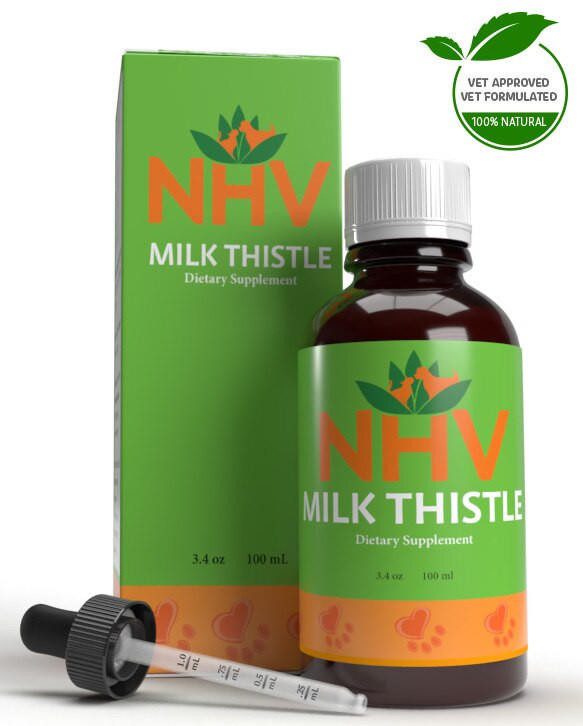
100% Natural Liver and Kidney Detox and Cancer Support in Cats
buy 2 and save $3
3 month supply for a small to medium size pet
A popular herb among conventional and holistic veterinarians, Milk Thistle is often recommended for cats who have liver disorders, are fighting cancer, diabetes, kidney issues, gallbladder and bile duct issues, as well as hyperthyroidism.

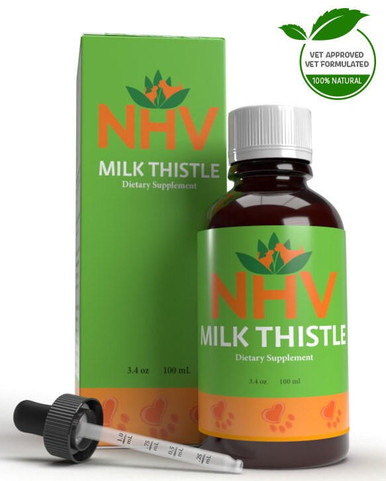
A popular herb among conventional and holistic veterinarians, Milk Thistle is often recommended for cats who have liver disorders, are fighting cancer, diabetes, kidney issues, gallbladder and bile duct issues, as well as hyperthyroidism.

Milk thistle, also known as Silybum Marianum is an herb that has been used for thousands of years by humans for its powerful medicinal properties. The active ingredient is Silymarin which contains flavonoids that have many beneficial properties including:
Milk thistle is one of the few herbs that have no equivalent in conventional medicine and has many uses. You can read about the many applications of Milk Thistle for cats and dogs on Dr. Hillary Cook's blog.
Milk Thistle for Liver Function
Milk Thistle for cats with liver disease is glycerin-based and safe for long-term use. This potent herbal formula provides excellent proactive support and can be taken in conjunction with conventional treatment.
Milk Thistle for Kidney Function
Milk Thistle for Anti-Cancer Support
Milk Thistle may also be beneficial to cats undergoing chemotherapy as Silymarium may enhance the activity of certain chemo drugs.
You can read Peachez's Story with Milk Thistle for cats and how it helped her with cancer and liver problems.
NHV’s certified organic Milk Thistle is a safe herb that is recommended and used by holistic practitioners. All of our products are all-natural and formulated by veterinarians with a focus on comprehensively supporting the health and well-being of your feline family member.
If you have questions about Milk Thistle or any of our plant-based products, ask an NHV expert because at NHV we want your kitty’s health to be purrfect!
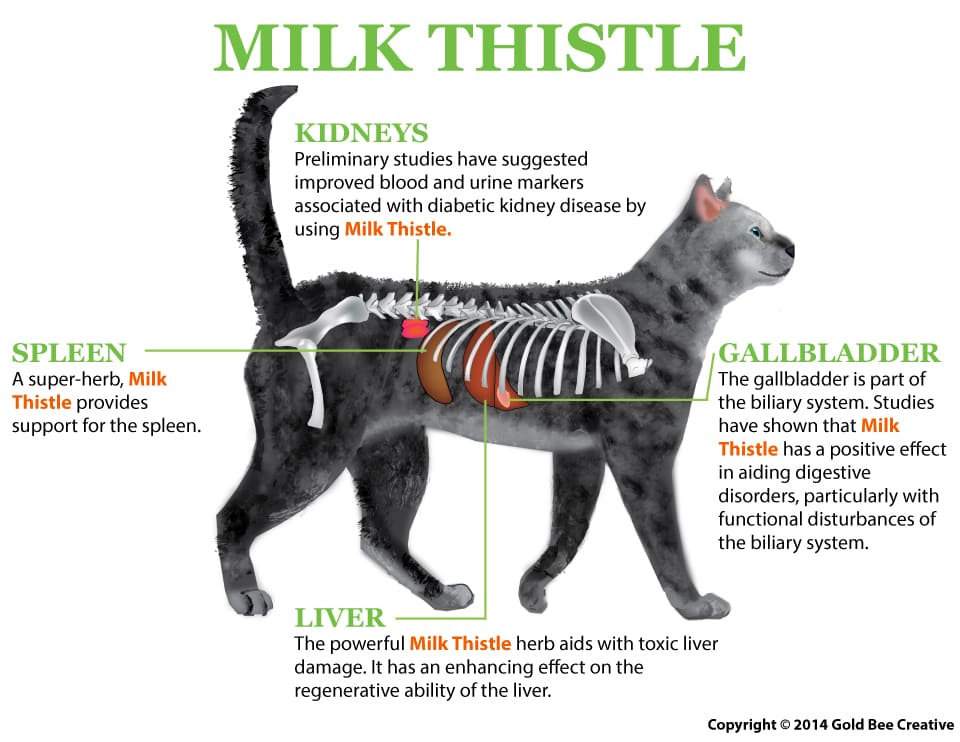
NHV’s Milk Thistle for Cats contains just one ingredient.
Select your pet's weight to determine the correct dose.
To be taken twice daily. Determine your pet’s weight and then use the easy chart below to determine the correct dose. This is the minimum dosage.
Pet's Weight Dosage
0 - 15 lb = 0.5 ml
16 - 30 lb = 1.0 ml
31 - 45 lb = 1.5 ml
46 - 60 lb = 2.0 ml
61 - 75 lb = 2.5 ml
Over 75 lb = 3.0 ml
How to Administer
Shake well before use. The easiest method is to use the dropper provide and places the drops into your pet’s food or favorite treat. You can also use the dropper and squirt directly into the pet’s mouth.
Some pets can be finicky, if this occurs consider hiding the drops in foods most pet’s love such as fish, chicken or yogurt or a favorite treat. If your pet only eats dry food then soak a few kibbles at feeding time.
For Best Results
Herbal dietary supplements are beneficial to the health and wellbeing of your pet and are safe for long-term use. Every pet responds to natural herbal supplements differently, therefore it is important to be consistent and administer the product daily. Supplements generally take two to four weeks to take effect, however this will vary from one animal to the next.
Product Storage
All NHV Natural Pet Products are pure herbal extracts and contain no artificial additives, preservatives or coloring. Shelf life after opening is 6 months and must be refrigerated after opening.
Cautions and Contraindications
Do not use Milk Thistle in pregnant or nursing animals. Speak to your vet before using our products. A second visit is recommended if your pet’s condition does not improve, or deteriorates after continued use of the supplements.
All information provided by NHV Natural Pet Products is for educational purposes only.
Milk thistle, also known as Silybum Marianum is an herb that has been used for thousands of years by humans for its powerful medicinal properties. The active ingredient is Silymarin which contains flavonoids that have many beneficial properties including:
Milk thistle is one of the few herbs that have no equivalent in conventional medicine and has many uses. You can read about the many applications of Milk Thistle for cats and dogs on Dr. Hillary Cook's blog.
Milk Thistle for Liver Function
Milk Thistle for cats with liver disease is glycerin-based and safe for long-term use. This potent herbal formula provides excellent proactive support and can be taken in conjunction with conventional treatment.
Milk Thistle for Kidney Function
Milk Thistle for Anti-Cancer Support
Milk Thistle may also be beneficial to cats undergoing chemotherapy as Silymarium may enhance the activity of certain chemo drugs.
You can read Peachez's Story with Milk Thistle for cats and how it helped her with cancer and liver problems.
NHV’s certified organic Milk Thistle is a safe herb that is recommended and used by holistic practitioners. All of our products are all-natural and formulated by veterinarians with a focus on comprehensively supporting the health and well-being of your feline family member.
If you have questions about Milk Thistle or any of our plant-based products, ask an NHV expert because at NHV we want your kitty’s health to be purrfect!

NHV’s Milk Thistle for Cats contains just one ingredient.
Select your pet's weight to determine the correct dose.
To be taken twice daily. Determine your pet’s weight and then use the easy chart below to determine the correct dose. This is the minimum dosage.
Pet's Weight Dosage
0 - 15 lb = 0.5 ml
16 - 30 lb = 1.0 ml
31 - 45 lb = 1.5 ml
46 - 60 lb = 2.0 ml
61 - 75 lb = 2.5 ml
Over 75 lb = 3.0 ml
How to Administer
Shake well before use. The easiest method is to use the dropper provide and places the drops into your pet’s food or favorite treat. You can also use the dropper and squirt directly into the pet’s mouth.
Some pets can be finicky, if this occurs consider hiding the drops in foods most pet’s love such as fish, chicken or yogurt or a favorite treat. If your pet only eats dry food then soak a few kibbles at feeding time.
For Best Results
Herbal dietary supplements are beneficial to the health and wellbeing of your pet and are safe for long-term use. Every pet responds to natural herbal supplements differently, therefore it is important to be consistent and administer the product daily. Supplements generally take two to four weeks to take effect, however this will vary from one animal to the next.
Product Storage
All NHV Natural Pet Products are pure herbal extracts and contain no artificial additives, preservatives or coloring. Shelf life after opening is 6 months and must be refrigerated after opening.
Cautions and Contraindications
Do not use Milk Thistle in pregnant or nursing animals. Speak to your vet before using our products. A second visit is recommended if your pet’s condition does not improve, or deteriorates after continued use of the supplements.
All information provided by NHV Natural Pet Products is for educational purposes only.
Published: January 21, 2021